Permaculture is a holistic design system that mimics natural ecosystems to create sustainable, self-sufficient, and regenerative landscapes and lifestyles. It is a philosophy and set of principles for creating a harmonious relationship between people and their environment, built on the three ethics of earth care, people care, and fair share. Permaculture extends beyond agriculture to include aspects of urban planning, rewilding, and low-impact living by integrating human activities with natural processes to minimise waste and enhance biodiversity.
Core concepts
- Nature-inspired design: It observes patterns in natural ecosystems to create more efficient and resilient human-made systems.
- Working with nature: The approach encourages collaboration with nature rather than opposing it, finding solutions within the system itself rather than using external force or chemicals.
- Sustainability: The goal is to create systems that are productive and self-sustaining indefinitely, focusing on responsible land stewardship.
Three ethics
- Earth care: Safeguarding and regenerating soil, water, forests, and other natural resources.
- People care: Supporting basic human needs and ensuring that everyone has fair access to resources.
- Fair share: Redirecting surplus resources, such as compost, seeds, or time, to support the first two ethics.
Practical applications
- Agriculture: Creating productive, self-sustaining farms through practices like crop rotation, rainwater harvesting, and companion planting.
- Land management: Designing landscapes, from backyards to entire communities, that are resilient and beneficial to the environment.
- Lifestyle: Integrating the principles into daily life to reduce environmental impact through responsible consumption, energy use, and recycling.

